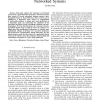Free Online Productivity Tools
i2Speak
i2Symbol
i2OCR
iTex2Img
iWeb2Print
iWeb2Shot
i2Type
iPdf2Split
iPdf2Merge
i2Bopomofo
i2Arabic
i2Style
i2Image
i2PDF
iLatex2Rtf
Sci2ools
112
click to vote
JSAC
2008
2008
A Game-Theoretical Study of Robust Networked Systems
This paper analyses the robustness of networked systems from a game-theoretical perspective. Networked systems often consist of several subsystems sharing resources interdependently based on local preferences. These systems can be modelled by a dependence game, which is a generalisation of stable paths problem. A unique pure Nash equilibrium in a dependence game can characterise the robustness of the represented networked system, precluding oscillations and nondeterminism. We show that the absence of a structure termed a generalised dispute wheel is useful to ensure the existence of a unique pure Nash equilibrium. Furthermore, we consider more sophisticated settings: tie-breaking over non-strict preferences and asynchronous communications among subsystems. We also obtain stronger results that the absence of a generalised dispute wheel can be useful to ensure the consistency of tie-breaking and asynchronous convergence to a pure Nash equilibrium.
Related Content
| Added | 13 Dec 2010 |
| Updated | 13 Dec 2010 |
| Type | Journal |
| Year | 2008 |
| Where | JSAC |
| Authors | Chi-Kin Chau |
Comments (0)

